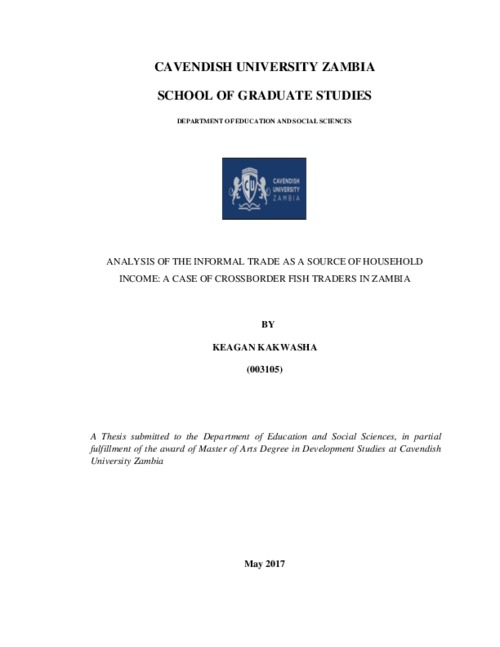Analysis of the Informal Trade as a Source of Household Income: A Case of Cross-border Fish Traders in Zambia

Citation
Kakwasha, K. (2017). Analysis of the Informal Trade as a Source of Household Income: A Case of Cross-border Fish Traders in Zambia. Cavendish University Zambia. Master Thesis.
The general objective of this study was to analyze the informal trade as source of household income with a special focus on cross border fish traders in Zambia. The study covers findings from border site fish markets in Nakonde, Kasumbalesa, Luangwa and Katimamulilo border posts. These locations represent massive movements of fish products across borders. Descriptive statistics were used to analyze the data. The author learnt that informal fish trade plays an important role in the income of people in various communities in Zambia, with at least 108,000 people engaged as full time informal cross border fish traders and 171,177,420 USD worthy of fish sold through informal routes. In terms of tonnage, the fish entering Zambia has been increasing from 77,199 tons in 2015 to 126,345 tons in 2016. However, the study established that only 23.13 percent of imported fish is sold within Zambia. The rest of the imported fish (97,119.06 tons) ends up in the DRC by informal trading through Kasumbalesa border post. The bulk of this was frozen horse mackerel traded through Katimamulilo border post to Kasumbalesa border to DRC. In other border posts, small sized and dried fish species dominated the markets. Despite of this, cross border fish traders face a lot of challenges to penetrate the lucrative markets in the neighboring countries. The formal sector is less attractive and this encourages traders to continue trading informally. The study recommends that organizations working with fish traders including the ministry responsible for fisheries should encourage efficient movement of fisheries commodities across the borders. Zambia has greater opportunities for trade in fisheries products in the region provided impediments to intra-regional trade are minimized. Successful trade provides crucial source of foreign exchange to help a nation‟s balance of payments, and also leads to increased employment as trade is directly linked to production. Furthermore, the multiplier effect in other businesses would further foster economic growth and improved livelihood for fishery-dependent communities.
Permalink
Date Available
Type
Publisher
Countries
Copyright
Adobe-2006
Topics
Language